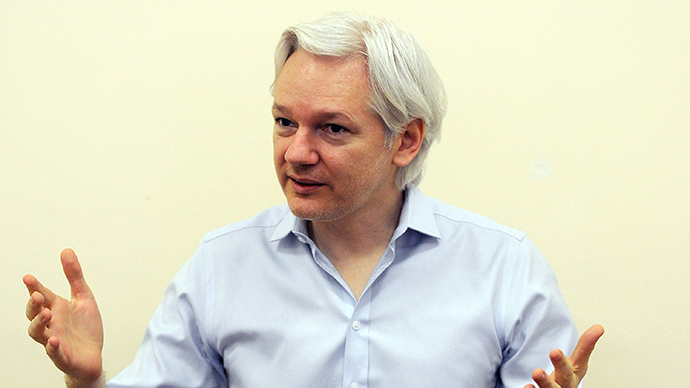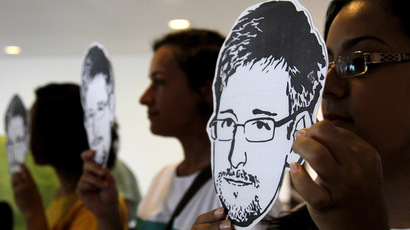Assange: Obama should consider his legacy

Barack Obama should start to consider his legacy and risks being remembered as the US President that most heavily oppressed journalism. That's the message from Julian Assange, who told media of a major new 50-country leak coming soon from Wikileaks.
Assange was speaking over phone to a number of journalists as he marks two years of living in the Ecuadorian embassy in London. The cost of keeping Assange in the embassy has already reached £6 million ($9.9 million), with the UK taxpayer having to foot the bill for the round the clock police presence to stop Assange trying to make a run for it.
Swedish Prosecution Authority on Julian #Assange case | BBC Radio 4 (archive) http://t.co/IuYzD6I9GV#svpol
— WikiLeaks (@wikileaks) June 18, 2014
The whistleblower has also urged US Attorney General Eric Holder drops case against Wikileaks or resign.
UK government physical encirclement of #Assange has now cost £6,350,099.96 http://t.co/ILyfzqI2xN#indyref
— WikiLeaks (@wikileaks) June 18, 2014
Assange said that he keeps a close contact with the defence team of another whistleblower also wanted by the US, Edward Snowden. However, he refused to answer the question whether he is in contact with Snowden due to "security situation" surrounding the both men.
The Ecuadorian ambassador, Juan Falconi Puig, warned earlier this month that Assange could remain there indefinitely and that he was visibly suffering from being confined to the small embassy building which does not have a garden.
As Assange himself revealed in the interview, he doesn't have a chance to watch the World Cup and the signal is very bad, which he attributes to security reason. "Of course Ecuador undoubtedly deserves to win the world cup," he said, noting that Brazil is likely to be the victor.
The 42 year old founder of Wikileaks is wanted in Sweden for questioning over rape allegation but he maintains the charges against him are politically motivated and that if he goes to answer the case against him in Sweden he will be extradited to the US, where he says he will face persecution for the revelations of US diplomatic cables published on Wikileaks.
When asked by a journalist from the UK’s Channel 4 News why, as someone who stands for international transparency, he won’t go and face the allegations against him in Sweden, Assange became defensive and angry, and deflected the question to his lawyer.
He maintained later in the phone call that even if his lawyers were successful in getting the Swedish authorities to drop the case, he would have the bigger problem of dealing with the US who, because of their special relationship with the UK, may simply just put in a request with the UK government to hand him over.
He reiterated his previous stance that WikiLeaks is experiencing the biggest investigation ever in US history into a publisher.
He also slammed companies such as MasterCard and PayPal for blocking WikiLeaks without any court order to do so, and said these types of large corporations require just as much scrutiny from the press and the public as governments.
Assange also said that the Australian government has been of no assistance whatsoever in his case.
When asked on numerous occasions whether he could see a way out of his predicament, he said that the British and Ecuadorian governments would have to sit down and talk to each other about his case.
He also insisted that the UK government is keeping him under 24-hour police surveillance for reasons of national security and not over a simple law enforcement issue.
He also rejected a suggestion from a US journalist that WikiLeaks publishes private gossip, insisting that the majority of leaks he has published amount to “serious material.”














